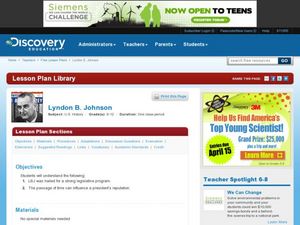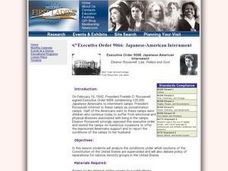K20 LEARN
Plessy v. Ferguson: An Individual's Response to Oppression
After generating research questions rated to segregation, groups are given a primary source document (Jim Crow Laws, Black Codes, Plessy v. Ferguson, etc.) and craft a presentation that details the key elements of their assigned...
Curated OER
Paul Conrad's Perspective on Civil Rights
Students review a political cartoon and discuss desegregation. In this cartoon analysis lesson, 11th graders discuss the impact of a political cartoon and its relation to a Supreme Court case. Students read additional information and...
Teaching Tolerance
Racial Disparity in the Criminal Justice System
Explore the impact of the war on drugs in a thought-provoking lesson for high school academics. Young historians delve into the world of the criminal justice system and the racial disparity that occurs in the US. The resource provides...
Teaching Tolerance
Jim Crow as a Form of Racialized Social Control
Just because slavery was illegal doesn't mean it went away ... Jim Crow Laws took its place. An eye-opening lesson focuses on how Jim Crow Laws were used as a form of racial social control against African Americans in the United States....
US House of Representatives
Keeping the Faith: African Americans Return to Congress, 1929–1970
The third instructional activity in a unit that traces the history of African Americans serving in the US Congress examines the period from 1929 through 1970. After reading a contextual essay that details the few African Americans...
Intersectional Black Panther Party History Project, IPHP
Teaching the History of the Black Panther Party: 5 Essential FAQ’s
What are the facts about the Black Panther Party? Was it, as J. Edgar Hoover contended, a terrorist organization and a threat to national security? Or a group of indviduals bound together by a desire to protect and nurture their...
Albert Shanker Institute
Dream Under Development
As part of their study of the 1963 March on Washington, class members do a side-by-side comparison of the original text of Martin Luther King's "I Have a Dream Speech" with a transcript of the speech he delivered. The take away from the...
National Park Service
Teaching with Historic Places: Discover the Jackie Robinson Ballpark
Can sports and popular culture change public opinion? That's the essential question asked by a lesson plan that looks at the role Jackie Robinson's appearance at City Island Ballpark in Daytona Beach, Florida played in the desegregation...
Teaching Tolerance
Dismantling Racial Caste
It's time to end racism. The final installment of the series encourages scholars to consider what is needed to ended the racial caste system in the U.S. Young historians complete group discussion, written prompt, and a hands-on-activity...
Teaching Tolerance
The War on Drugs—Mechanisms and Effects
The war on drugs doesn't have definite results. An interesting lesson examines the social, political, and economic effect of the war on drugs. Academics learn how the war on drugs has led to mass incarcerations and negatively affected...
Teaching Tolerance
Mass Incarceration as a Form of Racialized Social Control
Mass incarceration: A result of a tough stance on crime or racial discrimination, you decide. Academics explore the history and reasons behind mass incarcerations in the United States and its impact on ethnic communities. The...
Teaching Tolerance
Understanding the Prison Label
Break the chain. An engaging lesson examines why it is so hard to break free of the prison system in the US. Academics participate in a reader's theater, read primary sources, and discuss their thoughts. The lesson explains the hardships...
Newseum
The Freedom to Make a Change
As part of a study of the First Amendment, young historians research instances when individuals or groups used the First Amendment to change the United State's laws or policies. Teams are each assigned a different case study. With the...
American Institute of Physics
African American Physicists in the 1960s
Physicists Herman Branson and Tannie Stovall provide young scholars with two very different perceptions of the status of African American physicists in the 1960s. After reading and comparing the bios of these two men, class members read...
PBS
Latino Americans: Timeline of Important Dates
From 1500-2000, an interactive timeline details important events related to Latino Americans. Next, to each date are small, yet informative blurbs—some of which include videos.
American Institute of Physics
Meet Four Pioneering African American Astronauts
An out-of-this-world resource introduces young scientists to four African American astronauts: Michael P. Anderson, Ronald E. McNair, Guion S. Bluford Jr., and Jeanette J. Epps. Groups read biographies of these individuals and prepare...
Humanities Texas
A President's Vision: Lyndon Baines Johnson
Learners take a closer look at the presidency of Lyndon B. Johnson, including the Great Society and the passage of the Voting Rights Act, through image analysis and primary source worksheets.
Curated OER
Martine Luther King Jr. and John Lewis: Speeches at the March on Washington, August 1963
Ninth graders study the Civil Rights Movement. In this American History lesson, 9th graders analyze the speeches of major civil rights leaders. Students compare and contrast the meanings of these speeches.
Curated OER
Court Documents Related to
Students use the National Archives to researcj cout coduments related to Martin Luther King, Jr.
Curated OER
The 36th President: Lyndon B. Johnson, US History
Students research and analyze Lyndon B. Johnson's achievements as the 36th President focusing on his legislative program. They consider how the passage of time can influence a President's reputation.
Curated OER
Lyndon B. Johnson
Students take a closer look at legislation passed in the 1960s. In this Great Society lesson plan, students research 6 key pieces of legislation signed into law by Johnson. Students use their findings to write collaborative reports.
Curated OER
Johnson's Great Society (5)
In this online interactive American history worksheet, students answer 15 matching questions regarding Lyndon B. Johnson and the Great Society. Students may submit their answers to be scored.
Curated OER
Social Activism In The United States
Students explore justice issues. In this social activism lesson, students watch "Social Activism in the United States," and then locate newspaper articles from the 1960's and 1970's about events during the era.
National First Ladies' Library
Executive Order 9066: Japanese-American Internment
Students analyze conditions under which sections of United States Constitution are superceded, research history of Native Americans, African Americans, and Japanese Americans, and debate policy of reparations for various minority groups...

























